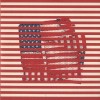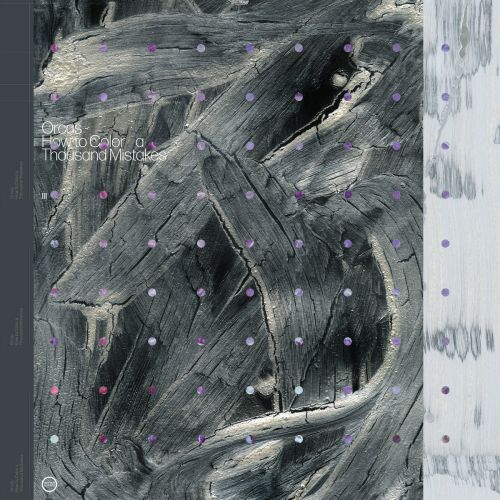Thrill Jockey
 The way Tortoise opens Standards, their fourth album, suggest that they want to have some fun with the listener’s possible preconceptions. The buzz and hum of a guitar amp makes way for a bombastic passage of music wholly unlike what Tortoise are known for. It could be that they’re poking fun at their own reputation for subdued, restrained compositions. Or indeed it could be a wider swipe at the whole ‘post rock’ genre in general; a term that makes the band bristle.
The way Tortoise opens Standards, their fourth album, suggest that they want to have some fun with the listener’s possible preconceptions. The buzz and hum of a guitar amp makes way for a bombastic passage of music wholly unlike what Tortoise are known for. It could be that they’re poking fun at their own reputation for subdued, restrained compositions. Or indeed it could be a wider swipe at the whole ‘post rock’ genre in general; a term that makes the band bristle.
This anthemic opening sequence of “Seneca” sounds more like
MC5 or
The Stooges; a large dose of psychedelics mixed in with garage rock fuzz. However, it is a false start; which cements the notion that it’s purposefully tongue in check. Once the drums kick in we’re back in more familiar territory, albeit with a lusher, fertile production. In fact that’s what sets this album apart from previous efforts, a decision to move away from the bleached, dry production sound of yore for something more colourful. Also, the addition of
Jeff Parker on guitar adds some genuine funk here and there. The rest of “Seneca” moves along with a propulsive forward momentum where
a dub reggae influence holds sway, albeit in a way that exceeds mere tokenism; something Tortoise always seemed to pull off. Rock guitar smears and harpsichord make their way into the piece, which exits with what sounds like several members handclapping. “Seneca” is indeed a strong opening track, which segues into “Eros;” without doubt the funkiest track that Tortoise had delivered up until now. A middle ground between Electronica (see IDM), and the pristine, updated jazz rock that Tortoise have made their own; “Eros” is a track that you can’t help smiling to; especially midway when Jeff Parker’s guitar actually makes one think of
Johnny Marr’s work with
The Smiths. The Smiths and Marr are an unlikely comparison, but one that can’t help being made.
A real surprise, and another winning number, is seventh track “Monica.” Here Tortoise not only sound funky, but sexy as well. Slinky synth cavorts with effect-laden drums and subtle wah wah guitar in what turns out to be a slice of futuristic space-age soul; instrumental, of course. “Eden 1” and “Eden 2” are vignettes that recall jazzy trip-hop and are, on the whole, unmemorable. “Blackjack,” “Six Pack,” and “Benway” all appear to fall into similar patterns to each other and seem heavily influenced by the sort of Jazz rock that you would have come to expect from early to mid 70s
Zappa. They’re tasteful; far more tasteful than the Jazz rock of yesteryear, but that’s always the case with Tortoise. However, if the original fusion wasn’t your thing, then these tracks may tend to grate somewhat; which is a shame as “Benway” starts out promisingly with
an air of retro-futurism that is far more interesting than the fiddly time changes and vibraphone play that ensue. This is a shame as it means that yet another Tortoise album turns out to be a patchy affair, depending on one’s own taste of course; and it leaves the question as to what an album more in the vein of pieces like “Monica,” “Seneca,” and “Eros” would have sounded like.
The closing track does nothing to save proceedings, sounding a lot like the problematic pieces already highlighted, and could have fitted neatly into
[post=tortoise-tnt text=”TNT”] or the latter half of
[post=tortoise-millions text=”Millions Now Living Will Never Die”] . Whether Tortoise albums are patchy or whether you feel they are a success depends on how much tolerance you have for the original incarnation of jazz rock/fusion; because, even though Tortoise have updated this sound and added elements of Dub, Krautrock, and the home listening end of Techno; there is still that Muzak™ inflected element that some may find a little smug ,and a tad jarring. Whereas on the very [post=tortoise text=”first album”] (and for the first half of the second)
Tortoise struck a perfect balance between these influences and a more sober, cool outlook from a 90s vantage point; by this point the excesses of fusion had started to trickle into more and more of their productions, despite the fact that they had decided to be braver and ‘branch out’. However, it has to be stated that the highlights of
Standards hint at great possibilities from a band that have had moments of transcending their influences and have shaped something relatively new.
-Jay Harper-
 The way Tortoise opens Standards, their fourth album, suggest that they want to have some fun with the listener’s possible preconceptions. The buzz and hum of a guitar amp makes way for a bombastic passage of music wholly unlike what Tortoise are known for. It could be that they’re poking fun at their own reputation for subdued, restrained compositions. Or indeed it could be a wider swipe at the whole ‘post rock’ genre in general; a term that makes the band bristle.
The way Tortoise opens Standards, their fourth album, suggest that they want to have some fun with the listener’s possible preconceptions. The buzz and hum of a guitar amp makes way for a bombastic passage of music wholly unlike what Tortoise are known for. It could be that they’re poking fun at their own reputation for subdued, restrained compositions. Or indeed it could be a wider swipe at the whole ‘post rock’ genre in general; a term that makes the band bristle.


